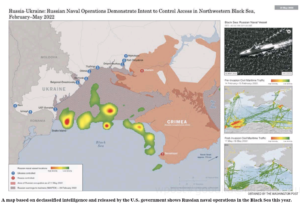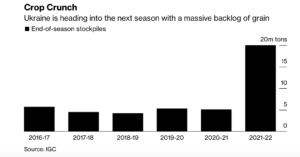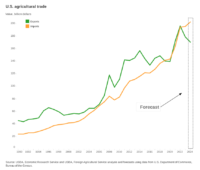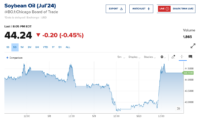Bloomberg's Clarice Couto reported this past Friday that "a surprising tax change in agriculture powerhouse Brazil has the potential to make soy grown in the world’s largest bean exporter less…
Russia Chokes Off Ukraine’s Exports, Seen as “Deliberate Attack” on Global Food Chain, Black Sea Escorting Warships Considered
Shane Harris reported on the front page of today’s Washington Post that, “Newly declassified U.S. intelligence shows that a Russian naval blockade has halted maritime trade at Ukrainian ports, in what world leaders call a deliberate attack on the global food supply chain that has raised fears of political instability and shortages unless grain and other essential agricultural products are allowed to flow freely from Ukraine.
“Russia’s navy now effectively controls all traffic in the northern third of the Black Sea, making it unsafe for commercial shipping, according to a U.S. government document obtained by The Washington Post.”

Today’s article noted that, “But Western powers have few options for ending the Russian blockade.
“The United States has no vessels in the Black Sea, Gen. Mark A. Milley, the chairman of the Joint Chiefs of Staff, told reporters at a news conference at the Pentagon on Monday. The Biden administration has steadfastly resisted any direct military involvement in the war.”
Harris added that, “Denmark plans to send Harpoon anti-ship missiles and a launcher to Ukraine, which could help pierce the blockade and get food exports flowing again. But it may take months to train Ukrainian military personnel on how to use the weapons and integrate them into the country’s coastal defenses, according to military experts.”
And Mark Landler, Matina Stevis-Gridneff, Erika Solomon and Patricia Cohen reported in today’s New York Times that, “Fears of a global food crisis are swelling as Russian attacks on Ukraine’s ability to produce and export grain have choked off one of the world’s breadbaskets, fueling charges that President Vladimir V. Putin is using food as a powerful new weapon in his three-month-old war.

“World leaders called on Tuesday for international action to deliver 20 million tons of grain now trapped in Ukraine, predicting that the alternative could be hunger in some countries and political unrest in others, in what could be the gravest global repercussion yet of Russia’s assault on its neighbor. At the World Economic Forum in Davos, Switzerland, where worries about the war’s consequences have eclipsed almost every other issue, speakers reached for apocalyptic language to describe the threat.
‘It’s a perfect storm within a perfect storm,’ said David Beasley, the executive director of the World Food Program, a United Nations agency. Calling the situation ‘absolutely critical,’ he warned, ‘We will have famines around the world.’
Today’s article stated that, “Ukraine’s agriculture ministry says that the Black Sea blockade has prevented 14 million tons of corn, 7 million tons of wheat and 3 million tons of sunflower seeds from reaching world markets. Ukrainian officials have accused Moscow of stealing Ukraine’s produce and then selling it abroad as Russian.”
The Times’ writers added that, “Western officials are circulating proposals for getting grain out of Ukraine, such as having multiple countries send warships to escort cargo ships from Ukrainian ports and run the blockade, but that runs the danger of a shooting confrontation with Russian vessels. Sending ships from NATO countries is considered particularly risky — like the rejected idea of having NATO members enforce a no-fly zone to keep Russian warplanes away from Ukraine — so much of the talk has been about countries outside the alliance taking part.
“But [Jens Stoltenberg], the NATO chief, warned that breaking the Black Sea blockade would be very hard.”
Bloomberg writers Natalia Drozdiak and Rosalind Mathieson reported yesterday that,
Support is growing in Europe to send warships to the Black Sea to escort freighters carrying Ukrainian grain, as the world worries about shortages and prices rise, according to Estonian President Alar Karis.
“The priority is to ensure grain gets to Africa and other developing countries, Karis said in an interview on Tuesday on the sidelines of the World Economic Forum in Davos.”
The Bloomberg article stated that, “Lithuanian Foreign Minister Gabrielius Landsbergis has told the Guardian newspaper his country was seeking a naval coalition ‘of the willing.’ Britain is in talks with allies about sending warships to the Black Sea, The Times newspaper reported. A government spokesperson said the UK would continue to work with other countries to find ways to resume the export of grain from Ukraine, but added ‘there are no current plans to deploy UK warships to the Black Sea.’
The Wall Street Journal editorial board indicated in today’s paper that, “The world needs a strategy to break Russia’s blockade of Ukrainian ports so it can export food and other goods, and that probably means a plan to use warships to escort merchant ships out of the Black Sea.”
The Journal editorial stated that, “If diplomacy doesn’t work, former Army Gen. Jack Keane suggests an international food and commercial escort operation may be needed, led by the U.S. This is best planned and pitched as a humanitarian operation. The mission would be to form an international coalition of warships to escort commercial vessels safely out of Odessa and the Black Sea. This would work as a coalition of the willing, and not a North Atlantic Treaty Organization project that would let Mr. Putin claim it is another NATO provocation.”
Meanwhile, Reuters News reported today that, “Russia is ready to provide a humanitarian corridor for vessels carrying food to leave Ukraine, in return for the lifting of some sanctions, the Interfax news agency cited Russian Deputy Foreign Minister Andrei Rudenko as saying on Wednesday.”







